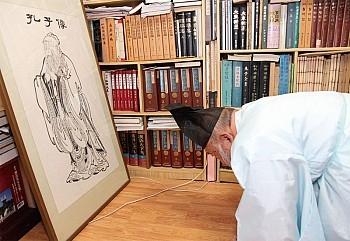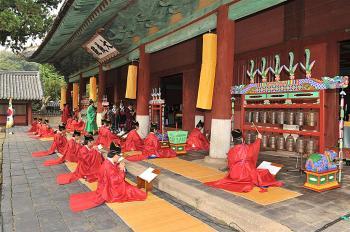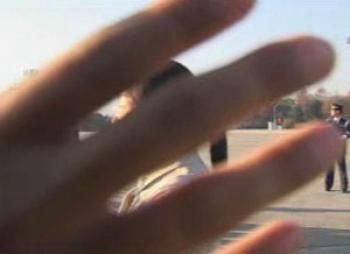“Since I was six years old, Confucius and Mencius have frequently come into my dreams to teach me Chinese and Confucian classics,” said Mr. Mun Sangho, a 93-year-old from South Korea.
“If I didn’t study diligently, they would beat me! The next morning I would wake up to find bruises on my body where I had been beaten, still very painful,” said Mun, who sat down with The Epoch Times in late 2012 to share his amazing experience of learning to read and write Chinese.
Because Mun Sangho’s family was poor, he could not afford to go to school to learn to read and write when he was a child. Magically, however, it seems that Confucius, Mencius, and other ancient sages often came into his dreams to teach him.
“When I was a little boy, I told the villagers that I had learned [to read and write] Chinese in my dreams. All of them thought that I was telling lies, or that I had some mental problem.” So, he kept the secret, from that time forward, until now.
Chinese Poetry Competition Champion
Having never attended school, Mun Sangho not only learned to read and write via the “magic” of his dreams, he also started teaching when he was a young man. He eventually became the Chinese teacher in Sungkyunkwan, the highest Confucian Institute in South Korea.
He also continued teaching students at home and says that he has had more than 1,000 students, with most of them becoming teachers. The former president of Korea, Park Chung-hee, was one of his students.
Mun also became a champion of poetry competitions, winning so many times that a special prize was created just for him, so that others could have a chance to win as well.
The night before one contest, he dreamed about the test questions, and, the next day, he was able to finish the test just after the contest began. A TV reporter from Korean MBC immediately became curious and asked Mun, “How could you finish it so quickly while others are still thinking hard about it?”
When Mun told him about his dream, the reporter didn’t believe it, “You’re joking!”
The TV reporter then went to Mun’s home for an interview and asked him how he had learned to read and write Chinese.
Mun lied, saying “I learned it from my mother.” He thought that no one would ever believe that he had learned Chinese in his dreams.
Reciting Books
Mun appears to have a nearly photographic memory. For instance, he can recite even the thickest of books, without a single mistake, after reading it only two or three times.
Once, Mun stunned some Chinese-language professors he was travelling with, reciting Confucian classics for them for six hours.
“During that time those who were skeptical about my memory decided to test me. They recorded my recitation of ‘Zizhi Tongjian’ (a famous Chinese chronicle published about 1,000 years ago) and checked it against the original. They found several differences, but it turned out that those were misprints in the book.”
Demonstrating for the reporter from The Epoch Times, Mr. Mun took out a classical Chinese book and started reciting it. Comparing it with the original book, the reporter found his recitation perfect.
Extraordinary State of Mind
Mr. Mun Sangho shared a few experiences from his past, which helped to shed some light on his extraordinary mindset.
He had attended a party where a guest had lost some money, and all the other guests claimed innocence. When Mr. Mun was asked, however, he said that he had taken the money, and then replaced the missing money from his own pocket.
Everyone knew that he wasn’t guilty, but his reasoning was, “Considering that the money had indeed been lost, if nobody would admit to stealing it, the atmosphere that day would have been affected. I said that I had taken the money so that the party would not be too bad of a memory for everyone.”
Later, a thief was caught and admitted that he had committed the theft. The secret had ultimately been revealed.
During the Korean War, a North Korean officer had tried to kill Mr. Mun, but failed. This officer eventually came to South Korea and settled there.
During the 1970s, for a short time Mr. Mun ran a hospital for traditional Chinese medicine, where he practiced medicine.
Many years after the Korean War, the officer brought his daughter to the hospital where Mr. Mun was working. Mr. Mun recognized the officer immediately. Not only did Mr. Mun not bear a grudge, he put even more effort into preparing medicine for the officer’s daughter, curing a difficult illness.
From that point on, whenever that officer had any trouble, Mr. Mun would try his best to be of service. He even became a witness for the officer’s daughter at her wedding.
Mr. Mun said, “‘Returning evil with goodness’ is a way to let others realize how they have done wrong, and that they have done such a thing to such a good person. Using compassion as a way to change the heart of another person—this is being a gentleman!”
Translation by Alex Wu and Jenny Yang. Written in English by Barbara Gay
Read the original Chinese article.



